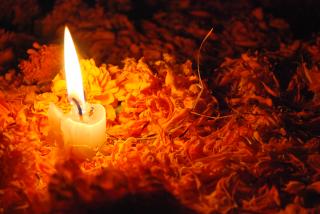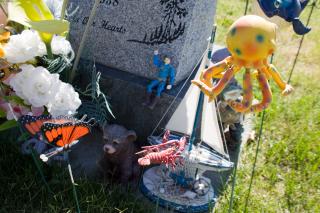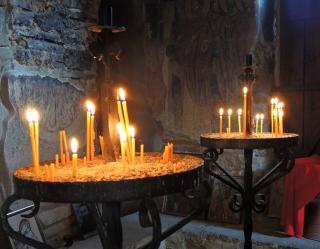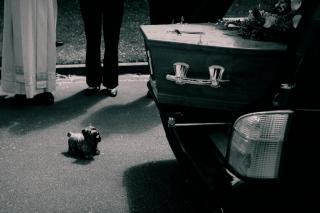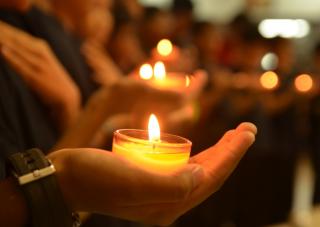
Día de los muertos (Day of the Dead) is a festive celebration in memory of those who have died. Its origins in Mesoamerica go back over 3,000 years, even though it was shaped by two Roman Catholic holidays: All Saints Day (November 1) and All Souls Day (November 2). In Spanish, All Saints Day and All Souls Day are known as El Día de Todos los Santos and El Día de los Muertos, respectively.
In southern and central Mexico, Día de los muertos entails many traditions: building private altars called ofrendas, honoring the deceased using sugar skulls, marigolds, and the favorite foods and beverages of the departed, and visiting graves with these as gifts. Visitors also leave possessions of the deceased at the graves.
Some themes: remembrance, grief, cycle of life and death, honoring those who have gone before us.
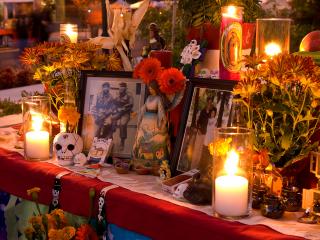
Please note that this holy day is a distinctly Mexican holiday, though some in other Latin American countries have adopted it. For that reason, it’s neither respectful nor appropriate for white congregations to initiate its celebration in worship. In the words of Rev. Marisol Caballero, “When white people ‘celebrate’ el Día de Los Muertos not as the personal, invited guest of Mexicans, it feels to me like someone has crashed a family funeral or a wake.”
To learn more about why UU congregations celebrating this day encroaches on the hurtful territory of cultural appropriation, please take the time to review the Decentering Whiteness in Worship video on this page.
This video conversation on Decentering Whiteness in Worship was recorded on September 12, 2017, between Julica Hermann de la Fuente, Glen Thomas Rideout, and Rev. Erika Hewitt.
As a matter of cultural competency, WorshipWeb encourages our Unitarian Universalist congregations to use the Spanish name “Día de los muertos,” rather than translating it into “Day of the Dead” in church announcements, programs, emails, etc. There are many holidays that retain their native language (Yom Kippur, Kwanzaa, Rosh Hashanah, etc.), and we seek to make this one of them.
Please make sure to use the correct spelling of all words, which includes accents. Here’s a tip for getting the í in Día:
- Windows: press Ctrl+’ then the vowel (Ctrl+’ then i = í)
- Mac: press Option+E, then the vowel (Option+E then i = í)
- iOS: press and hold I until a menu of accented characters appears
Displaying 1 – 12 of 12
Changing a filter will refresh results (and remaining options) immediately. Searching by keyword requires use of the "Search" button.
-
The dead aren’t really dead; their stories are perpetually being told by the world around us.Reflection | By Tania Y Márquez | October 27, 2021 | From Braver/WiserTagged as: All Souls Day, Día de los Muertos, Interfaith, Worship
-
In my small-town congregation, our beloved dead seem to linger with us for a little while.Reflection | By Elea Kemler | October 31, 2018 | From Braver/WiserTagged as: 4th Principle (Truth & Meaning), All Souls Day, Awe, Death, Día de los Muertos, Direct Experience, Generations, Grief, Love, Memorial Services, Mystery, Remembrance Day, Sorrow
-
Holy One, on this day of remembrance we say aloud their names again: the names of those who died this year. Died — the word is jarring. So jarring that we hardly use the word, substituting euphemisms that are a bit more vague. Sometimes people say “lost” when what they mean is dead: “We lost...Prayer | By Lori Walke | January 4, 2018 | From WorshipWebTagged as: 4th Principle (Truth & Meaning), All Souls Day, Death, Día de los Muertos, Direct Experience, Family, Generations, Grief, Honesty, Love, Memorial Day, Memorial Services, Remembrance Day
-
We remember the joys our departed gave us which opened us up to the life shared which is now ours to steward.Meditation | By Leslie Takahashi | December 8, 2016 | From WorshipWebTagged as: All Saints Day, All Souls Day, Death, Día de los Muertos, Direct Experience, Family, Generations, Grief, Immanence, Life Transition, Memorial Services, Mystery, Spirituality, Unitarian Universalism, Wholeness
-
Gather we now into this space, this time when the Wheel turns and the Veil shatters. Gather we now to remember, to grieve, to prophesy, to complete our harvests before the Long Dark comes. Gather we now to tell the Old Stories and sing the Old Songs, to be as we have always been —the Voice of our...Invocation | By Andrea Hawkins-Kamper | October 26, 2016 | From WorshipWebTagged as: 3rd Principle (Acceptance & Spiritual Growth), 7th Principle (Interconnected Web), All Souls Day, Autumnal Equinox, Community, Connections, Día de los Muertos, Earth-Centered, Generations, Halloween, Interdependence, Paganism, Reverence, Sacred, Samhain, Spirituality, Tradition, Unitarian Universalism
-
They once dwelled among us, the people of memory.Responsive Reading | By Heather K Janules | October 24, 2016 | From WorshipWebTagged as: 7th Principle (Interconnected Web), All Saints Day, All Souls Day, Death, Día de los Muertos, Family, Generations, Gratitude, Memorial Services, Samhain
-
In this hour of holy stillness we gather to honor the life and the person we love. In this hour of Holy Stillness we remind ourselves that the flames of life and love are never fully extinguished. In this hour of Holy Stillness we offer ourselves for sharing the weight of each other’s grief. In...Opening | By Patricia Shelden | April 13, 2016 | From WorshipWebTagged as: 1st Principle (Worth & Dignity), Acceptance, Animal Memorial, Death, Día de los Muertos, Ending, Grief, Healing, Holocaust Remembrance / Yom Ha'Shoah, Letting Go, Memorial Day, Memorial Services, Sadness
-
We light this flame As our fervent plea to brighten the dark corners of our hearts; We hold this flame For in it is the promise of warmth for souls grown cold in loss and despair; We kindle this light That we might continue to find comfort in its warmth; strength in its light; holiness in its...Chalice Lighting | By S. William Feiss | November 10, 2015 | From WorshipWebTagged as: 1st Principle (Worth & Dignity), 7th Principle (Interconnected Web), All Souls Day, Animal Memorial, Death, Día de los Muertos, Forgiveness, Healing, Love, Meaning, Memorial Services, Purpose, Sacred, Samhain, Sorrow, Strength, Truth
-
As we begin to settle to a deeper more inward place; to be fully present right now in this place made for head and heart together; we might begin to feel how our own bodies are not only flesh and blood — but skeleton bones as well. No matter how old we are, no matter how we move from place to...Meditation | By Katie Kandarian-Morris | October 26, 2015 | From WorshipWebTagged as: All Souls Day, Awe, Body, Día de los Muertos, Direct Experience, Nature, Playfulness
-
In the struggles we choose for ourselves, in the ways we move forward in our lives and bring our world forward with us, It is right to remember the names of those who gave us strength in this choice of living. It is right to name the power of hard lives well-lived. We share a history with those...Affirmation | By Kathleen McTigue | April 26, 2015 | From WorshipWebTagged as: All Saints Day, All Souls Day, Día de los Muertos, Generations, History, Justice, Leadership, Memorial Services, Ordinations, Progress, Responsibility
-
Lighting a candle is somewhat like the beginning of life. If that is true, then perhaps extinguishing a candle is like the ending of life. But death may not be the end of us. We live on in the memories of friends and loved ones....Chalice Extinguishing | By Lee Huebert | January 21, 2015 | From WorshipWebTagged as: All Souls Day, Death, Día de los Muertos, Letting Go, Memorial Services, Mystery, Purpose, Remembrance Day, Unitarian Universalism, Wonder
-
(Tea lights are set up in groups of 50 on either side of the chancel in this ritual borrowed from Soulful Sundown.) The long Summer has faded, now, and these first days of November mark the beginning of the coming of Winter....Reading | By Christine Robinson | January 21, 2015 | From WorshipWebTagged as: All Souls Day, Community, Connections, Día de los Muertos, Family, Grief, Halloween, Letting Go, Relationships, Samhain
